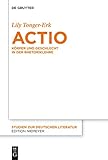Actio : Körper und Geschlecht in der Rhetoriklehre / Lily Tonger-Erk.
Material type: TextSeries: Studien zur deutschen Literatur ; 196Publisher: Berlin ; Boston : De Gruyter, [2012]Copyright date: ©2012Description: 1 online resource (490 p.)Content type:
TextSeries: Studien zur deutschen Literatur ; 196Publisher: Berlin ; Boston : De Gruyter, [2012]Copyright date: ©2012Description: 1 online resource (490 p.)Content type: - 9783110266368
- 9783110267266
- 808.5 23
- PN4155 .T66 2012
- online - DeGruyter
- Issued also in print.
| Item type | Current library | Call number | URL | Status | Notes | Barcode | |
|---|---|---|---|---|---|---|---|
 eBook
eBook
|
Biblioteca "Angelicum" Pont. Univ. S.Tommaso d'Aquino Nuvola online | online - DeGruyter (Browse shelf(Opens below)) | Online access | Not for loan (Accesso limitato) | Accesso per gli utenti autorizzati / Access for authorized users | (dgr)9783110267266 |
Browsing Biblioteca "Angelicum" Pont. Univ. S.Tommaso d'Aquino shelves, Shelving location: Nuvola online Close shelf browser (Hides shelf browser)

|

|

|

|

|

|

|
||
| online - DeGruyter Proklos, "Tria opuscula" : Textkritisch kommentierte Retroversion der Übersetzung Wilhelms von Moerbeke / | online - DeGruyter Roman Lyric : Collected Papers on Catullus and Horace / | online - DeGruyter Forms and Concepts : Concept Formation in the Platonic Tradition / | online - DeGruyter Actio : Körper und Geschlecht in der Rhetoriklehre / | online - DeGruyter Identity Formation in Globalizing Contexts : Language Learning in the New Millennium / | online - DeGruyter Handbook of Medieval Culture : Fundamental Aspects and Conditions of the European Middle Ages. Volume 1 / | online - DeGruyter Aktiengesetz : Großkommentar. Lieferung 37, §§ 222-240 / |
Dissertation Universität Münster 2010.
Frontmatter -- Inhalt -- I Prolog: Körperbildungsmacht Rhetorik -- II Körper-Rede, Macht, Geschlecht: Rhetorik mit Pierre Bourdieu und Judith Butler -- III Aufführung von Männlichkeit: Actio und Geschlechterdifferenz in der alten Rhetorik -- III.1 Einleitung -- III.2 Antike Konzeptionen der actio und ihr gendering -- III.3 Das rhetorische Subjekt -- III.4 Die rhetorische Situation -- III.5 Synthese -- Exkurs: Damen und Herren im Gespräch: Actio in der Gesprächsrhetorik des 16. und 17. Jahrhunderts -- 1 Ein weiblicher vir bonus? Castigliones Hofdame -- 2 Bildungsmittel weiblicher Rhetorik: Harsdörffers Frauenzimmer Gesprächspiele -- IV Ansehen von Weiblichkeit: actio und Geschlechterdifferenz im 18. Jahrhundert -- IV.1 Einleitung -- IV.2 Das Frauenzimmer als Rednerin: Positionen der Frühaufklärung -- IV.3 Geschlechtsneutrale Aktion? Actio in Rhetoriken -- IV.4 Praktische Bildung: Actio in Erziehungsliteratur -- IV.5 Anstand im Leibe: Actio in der Anstandsliteratur -- IV.6 Synthese -- V Rhetorische Aneignung: Actio und Geschlechterdifferenz um 2000 -- V.1 Einleitung: Actio in Populärrhetoriken für Frauen -- V.2 Rhetorisches Subjekt und rhetorische Situation -- V.3 Aktuelle Definitionen der actio und ihr gendering -- V.4 Rhetorik-Training -- V.5 Die geschlechtliche Codierung von Gespräch und öffentlicher Rede -- VI Epilog -- VII Literaturverzeichnis -- VII.1 Quellen -- VII.2 Forschungsliteratur
restricted access online access with authorization star
http://purl.org/coar/access_right/c_16ec
From antiquity until the twentieth century, rhetorical training was exclusively concerned with forming male speakers as well as producing an explicitly masculine speaking style and method. This study focuses on such body and gender-specific training by analyzing the actio doctrine. The book also demonstrates how the “transformation” of rhetoric in the eighteenth century was accompanied for the first time by a discursive shift: gesture, imitation, voice, and dress guidelines were adapted for use with both genders in general education and to teach the art of conversation.
Von der Antike bis ins 20. Jahrhundert bildet die Rhetorik ausschließlich den Mann als Redner aus und leitet zu einer explizit männlichen Art und Weise des Redeauftritts (actio) an. Die Studie nimmt diese – körperliche und geschlechtsspezifische – Ausbildung durch die actio-Lehre in den Blick. Dabei zeigt sie, wie mit der ‚Transformation‘ der Rhetorik im 18. Jahrhundert diskursive Verschiebungen einhergehen: Die rhetorischen Regeln für Gestik, Mimik, Stimmführung und Kleidung werden von der Konversations- und Erziehungslehre adaptiert und erstmals für beide Geschlechter ausformuliert.
Issued also in print.
Mode of access: Internet via World Wide Web.
In German.
Description based on online resource; title from PDF title page (publisher's Web site, viewed 28. Feb 2023)


